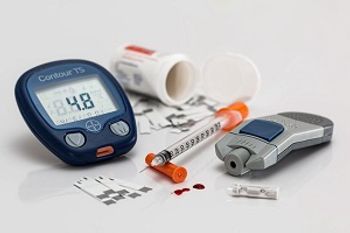
Diabetes
Latest News
Latest Videos

CME Content
More News

The authors say there has been a recent uptick in hosptial admissions from hypoglycemic events, and that a therapy to address this is needed.

Health plans are under scrutiny to address social determinants of health, which include food insecurity and poor housing.

The ban on letting people in Medicare connect their continuous glucose monitor (CGM) to a smartphone drew ire from patients, advocates, and even the Government Accountability Office.

The prevalence and predictors of hypoglycemia in South Korean patients with type 2 diabetes were evaluated using a nationwide healthcare database.

Nearly two-thirds of those participating in the study reported feelings of stigma from having to manage type 1 diabetes.

The authors speculated that some cancer regimens, such as those with corticosteroids, cause hyperglycemia.

Among HIV-positive women with diabetes, HIV control has improved over time, but diabetes control has not.

Every week, The American Journal of Managed Care® recaps the top managed care news of the week, and you can now listen to it on our podcast, Managed Care Cast.

The top status comes as digital providers, such as Omada Health, are trying to convince CMS to include them in the Medicare National Diabetes Prevention Program program.

This week, the top managed care stories include Senator Bill Cassidy's new plan to lower healthcare costs; policy recommendations from the American Diabetes Association on how to lower insulin prices; and coverage from the American Society of Clinical Oncology annual meeting.

Coverage of our peer-reviewed research and news reporting in the healthcare and mainstream press.

The results support other evidence that suggests the link between irregular eating patterns and diabetes is distinctly different from the one that drives obesity.

Every week, The American Journal of Managed Care® recaps the top managed care news of the week, and you can now listen to it on our podcast, Managed Care Cast.

This week, the top managed care stories include the finding that new guidelines will mean the number of people with hypertension will soar; research finds that most diabetes apps don’t lower glycated hemoglobin; and a health plan announced its plan to fight housing instability.

The American Diabetes Association (ADA) released a set of policy recommendations designed to spotlight the increasing difficulties patients with diabetes have affording insulin or gaining access to the life-saving medication. The recommendations follow the findings of a working group about the issue, the findings of which were presented to the Special Senate Committee on Aging earlier this month.

The American Diabetes Association (ADA) released a set of policy recommendations designed to spotlight the increasing difficulties patients with diabetes have affording insulin or gaining access to the life-saving medication. The recommendations follow the findings of a working group about the issue, the findings of which were presented to the Special Senate Committee on Aging earlier this month.

Clinical trial data has shown that the drug helped 28.6% of patients achieve glycated hemoglobin of 7.0% of less by week 24 without severe hypoglycemia or diabetic ketoacidosis and also helped participants lose weight.

The health hazards of workplace wellness programs fall within 6 categories.

The study comes as FDA is moving to bring more order to the area of mobile health. It is in the midst of a pilot for a precertifcation process that involves well-known companies such as Apple, Verily, and diabetes-specific companies like Tidepool.

Approximately 20% of patients with epilepsy have a co-occurring autoimmune disorder, and autoantibodies directed against the smaller isoform of glutamate decarboxylase (GAD65Ab) have been found in patients with epilepsy, as well as in patients with stiff person syndrome and type 1 diabetes.

Organizers of the project said it aims to build a better set of data on hypoglycemia that will help researchers and clinicians understand the condition, predict it, and gauge its cost.

Coverage of our peer-reviewed research and news reporting in the healthcare and mainstream press.

In testimony before a Senate committee, the chief scientific and medical officer said no single stakeholder is at fault, but the entire system of insulin delivery must be examined to make things better for consumers.

FDA Commissioner Scott Gottlieb, MD, has embraced the calorie counts at restaurants a year after his agency put them hold on the eve of his arrival. A Nutrition Facts label update is delayed but not scuttled, in contrast with the reversal of school lunch changes from the Obama administration.

Formulary restrictions on brand name noninsulin antihyperglycemic drugs have little impact on treatment intensification patterns among low-income patients with diabetes in Medicare Part D.















